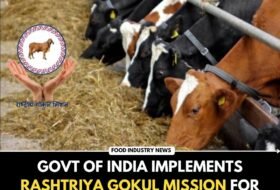In a significant move to address the growing public health crisis of antimicrobial resistance (AMR), the Food Safety and Standards Authority of India (FSSAI) has banned the use of certain antibiotics in the production of meat, milk, poultry, eggs, and aquaculture products. The ban, introduced in October 2024, is expected to significantly enhance livestock farming practices in India while safeguarding public health.
A Growing Global Concern
Antimicrobial resistance has emerged as a critical issue worldwide, making common bacterial infections harder to treat with standard antibiotics. Misuse of antibiotics in animal farming has been identified as a major contributor to AMR, with residues often entering the human food chain through meat and dairy products.
“India, being one of the largest producers and exporters of milk, eggs, fish, and poultry meat, needs to regulate antibiotic usage to sustain its global market position,” said Susmitha Bynagari, Consumer Analyst at GlobalData. The ban aligns India with neighboring countries like Bangladesh, Sri Lanka, Thailand, Vietnam, and Singapore, which have implemented similar measures.
Enhancing Food Safety and Livestock Practices
The new regulation is expected to improve the quality of livestock farming by promoting healthier and more sustainable practices. India has committed to reducing the use of antimicrobials in animal production by 30-50% by 2030, a step that will contribute to the global fight against AMR.
Indian consumers are also driving this shift with their preference for healthier food options. A GlobalData survey revealed that 73% of Indian consumers prioritize well-being when making food and beverage purchasing decisions, underlining a demand for safer and antibiotic-free products.
Challenges and the Path Ahead
While the ban is a progressive step, experts stress the importance of strict enforcement to ensure its success. “FSSAI must consistently monitor and enforce the ban across the country to maintain the quality of products and safeguard public health,” said Francis Gabriel Godad, Consumer Business Development Manager at GlobalData.
A grassroots approach, including awareness campaigns and training for farmers, is crucial to reduce reliance on antibiotics in animal farming. Collaborative efforts between government bodies, producers, and consumers will be key to achieving long-term success in combating AMR.
A Win for Public Health and Global Markets
India’s proactive stance on regulating antibiotics in livestock farming not only protects domestic consumers but also reinforces its position as a leading global exporter of animal-based products. By addressing AMR at its roots, India is setting an example for sustainable farming practices that prioritize both health and market integrity.
This landmark decision marks a critical step forward in ensuring safer food systems and healthier communities for future generations.
🚨Be Aware, We never charge any consultancy fee for jobs.
📲Foodtech Network WhatsApp Jobs Group
🔗 WhatsApp Groups
⚙️ Food Entrepreneurs & Startups (Our services)
🔗 https://bit.ly/3JDyPIN
🏅 Food safety training and certification.
🔗 Foodtech Network Academy





















